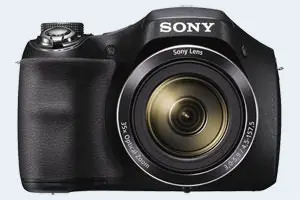Sony H300 vs NEX-3N
The Sony Cyber-shot DSC-H300 and the Sony Alpha NEX-3N are two digital cameras that were announced, respectively, in February 2014 and February 2013. The H300 is a fixed lens compact, while the NEX-3N is a mirrorless interchangeable lens camera. The cameras are based on a 1/2.3-inch (H300) and an APS-C (NEX-3N) sensor. The H300 has a resolution of 19.9 megapixels, whereas the NEX-3N provides 16 MP.
Below is an overview of the main specs of the two cameras as a starting point for the comparison.

Check H300 offers at
ebay.com

Check NEX-3N offers at
ebay.com
Going beyond this snapshot of core features and characteristics, what are the differences between the Sony Cyber-shot DSC-H300 and the Sony Alpha NEX-3N? Which one should you buy? Read on to find out how these two cameras compare with respect to their body size, their imaging sensors, their shooting features, their input-output connections, and their reception by expert reviewers.
Body comparison
The physical size and weight of the Sony H300 and the Sony NEX-3N are illustrated in the side-by-side display below. The two cameras are presented according to their relative size. Three consecutive views from the front, the top, and the rear side are shown. All size dimensions are rounded to the nearest millimeter.
The NEX-3N can be obtained in two different colors (black, white), while the H300 is only available in black.
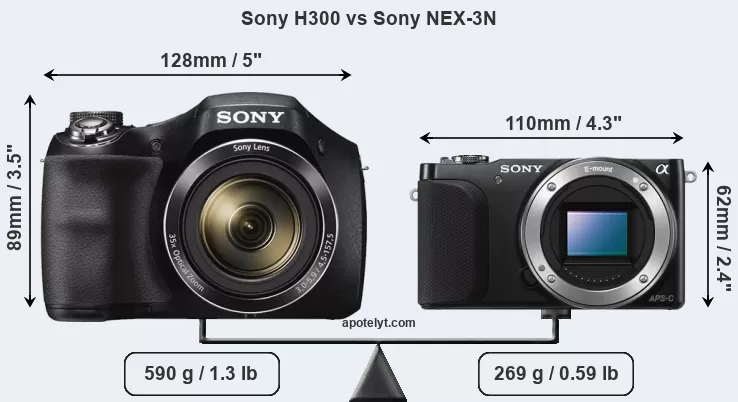
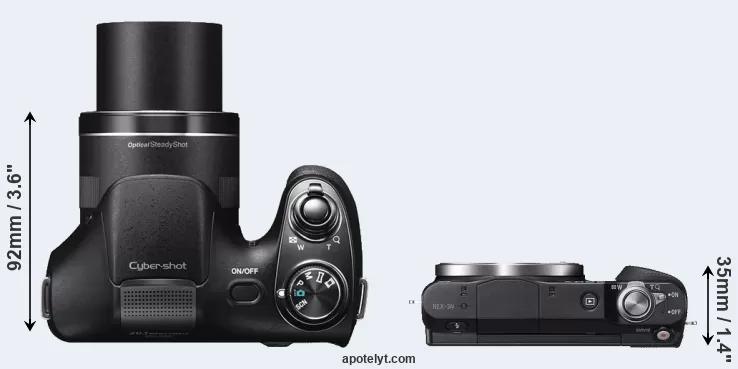
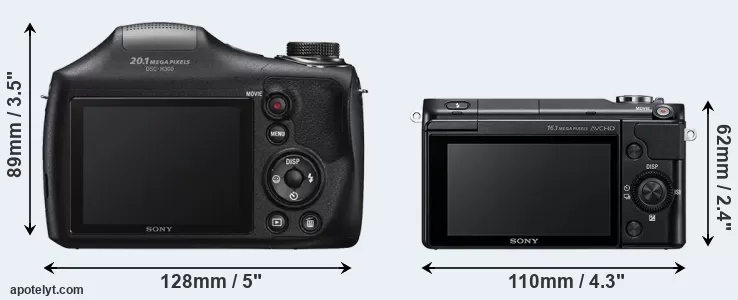
If the front view area (width x height) of the cameras is taken as an aggregate measure of their size, the Sony NEX-3N is considerably smaller (40 percent) than the Sony H300. In this context, it is worth noting that neither the H300 nor the NEX-3N are weather-sealed.
The above size and weight comparisons are to some extent incomplete and possibly misleading, as the H300 has a lens built in, whereas the NEX-3N is an interchangeable lens camera that requires a separate lens. Attaching the latter will add extra weight and bulk to the setup. You can compare the optics available for the NEX-3N and their specifications in the Sony E-Mount Lens Catalog.
The following table provides a synthesis of the main physical specifications of the two cameras and other similar ones. If you would like to visualize and compare a different camera combination, you can navigate to the CAM-parator app and make your selection from a broad list of cameras there.

| Camera Model |
Camera Width |
Camera Height |
Camera Depth |
Camera Weight |
Battery Life |
Weather Sealing |
Camera Launch |
Launch Price (USD) |
Street Price |
||
|---|---|---|---|---|---|---|---|---|---|---|---|
| 1. | Sony H300 | 128 mm | 89 mm | 92 mm | 590 g | 350 | n | Feb 2014 | 219 | ebay.com | |
| 2. | Sony NEX-3N | 110 mm | 62 mm | 35 mm | 269 g | 480 | n | Feb 2013 | 499 | ebay.com | |
| 3. | Canon SX610 | 105 mm | 61 mm | 27 mm | 191 g | 270 | n | Jan 2015 | 249 | ebay.com | |
| 4. | Sony A5000 | 110 mm | 63 mm | 36 mm | 269 g | 420 | n | Jan 2014 | 449 | ebay.com | |
| 5. | Sony A5100 | 110 mm | 63 mm | 36 mm | 283 g | 400 | n | Aug 2014 | 549 | ebay.com | |
| 6. | Sony H200 | 123 mm | 83 mm | 87 mm | 530 g | 240 | n | Jan 2013 | 249 | ebay.com | |
| 7. | Sony H400 | 130 mm | 95 mm | 122 mm | 628 g | 300 | n | Feb 2014 | 319 | ebay.com | |
| 8. | Sony HX90V | 102 mm | 58 mm | 36 mm | 245 g | 360 | n | Apr 2015 | 429 | ebay.com | |
| 9. | Sony HX95 | 102 mm | 58 mm | 36 mm | 242 g | 370 | n | Aug 2018 | 429 | ebay.com | |
| 10. | Sony HX99 | 102 mm | 58 mm | 36 mm | 242 g | 370 | n | Aug 2018 | 449 | ebay.com | |
| 11. | Sony HX350 | 130 mm | 93 mm | 103 mm | 652 g | 300 | n | Dec 2016 | 449 | ebay.com | |
| 12. | Sony HX400V | 130 mm | 93 mm | 103 mm | 660 g | 300 | n | Feb 2014 | 499 | ebay.com | |
| 13. | Sony NEX-3 | 117 mm | 62 mm | 33 mm | 297 g | 330 | n | May 2010 | 599 | ebay.com | |
| 14. | Sony NEX-5 | 111 mm | 59 mm | 38 mm | 287 g | 330 | n | May 2010 | 699 | ebay.com | |
| 15. | Sony NEX-F3 | 117 mm | 67 mm | 42 mm | 314 g | 470 | n | May 2012 | 599 | ebay.com | |
| 16. | Sony RX1R II | 113 mm | 65 mm | 72 mm | 507 g | 220 | n | Oct 2015 | 3,299 | ebay.com | |
| 17. | Sony RX100 IV | 102 mm | 58 mm | 41 mm | 298 g | 280 | n | Jun 2015 | 999 | ebay.com | |
| Note: Measurements and pricing do not include easily detachable parts, such as add-on or interchangeable lenses or optional viewfinders. | |||||||||||
Any camera decision will obviously take relative prices into account. The manufacturer’s suggested retail prices give an idea on the placement of the camera in the maker’s lineup and the broader market. The H300 was launched at a lower price than the NEX-3N, despite having a lens built in. Usually, retail prices stay at first close to the launch price, but after several months, discounts become available. Later in the product cycle and, in particular, when the replacement model is about to appear, further discounting and stock clearance sales often push the camera price considerably down.
Sensor comparison
The size of the imaging sensor is a crucial determinant of image quality. A large sensor will tend to have larger individual pixels that provide better low-light sensitivity, wider dynamic range, and richer color-depth than smaller pixel-units in a sensor of the same technological generation. Further, a large sensor camera will give the photographer additional creative options when using shallow depth-of-field to isolate a subject from its background. On the downside, larger sensors tend to be associated with larger, more expensive camera bodies and lenses.
Of the two cameras under consideration, the Sony H300 features a 1/2.3-inch sensor and the Sony NEX-3N an APS-C sensor. The sensor area in the NEX-3N is 1204 percent bigger. As a result of these sensor size differences, the cameras have a format factor of, respectively, 5.6 and 1.5. The sensor in the H300 has a native 4:3 aspect ratio, while the one in the NEX-3N offers a 3:2 aspect.
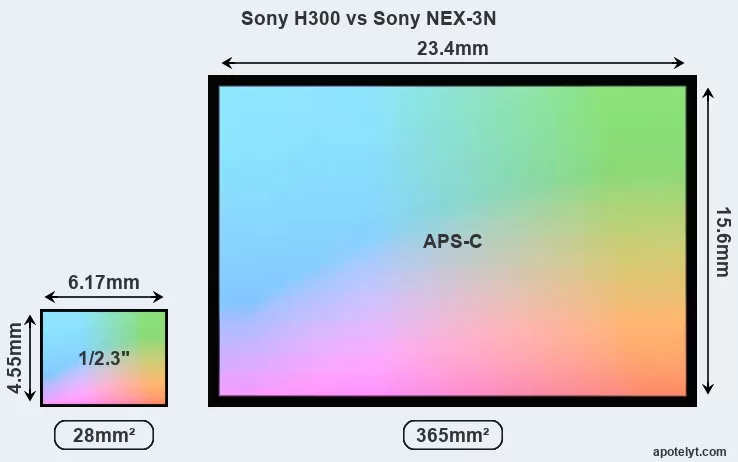
Despite having a smaller sensor, the Sony H300 offers a higher resolution of 19.9 megapixels, compared with 16 MP of the Sony NEX-3N. This megapixels advantage comes at the cost of a higher pixel density and a smaller size of the individual pixel (with a pixel pitch of 1.19μm versus 4.78μm for the NEX-3N). However, it should be noted that the H300 is a somewhat more recent model (by 11 months) than the NEX-3N, and its sensor might have benefitted from technological advances during this time that partly offset its pixel-size disadvantage. Coming back to sensor resolution, it should be mentioned that the H300 has no anti-alias filter installed, so that it can capture all the detail its sensor resolves.
The resolution advantage of the Sony H300 implies greater flexibility for cropping images or the possibility to print larger pictures. The maximum print size of the H300 for good quality output (200 dots per inch) amounts to 25.8 x 19.3 inches or 65.4 x 49.1 cm, for very good quality (250 dpi) 20.6 x 15.5 inches or 52.3 x 39.3 cm, and for excellent quality (300 dpi) 17.2 x 12.9 inches or 43.6 x 32.7 cm. The corresponding values for the Sony NEX-3N are 24.6 x 16.3 inches or 62.4 x 41.5 cm for good quality, 19.6 x 13.1 inches or 49.9 x 33.2 cm for very good quality, and 16.4 x 10.9 inches or 41.6 x 27.6 cm for excellent quality prints.
The Sony Cyber-shot DSC-H300 has a native sensitivity range from ISO 80 to ISO 3200. The corresponding ISO settings for the Sony Alpha NEX-3N are ISO 200 to ISO 16000 (no boost).
In terms of underlying technology, the H300 is build around a CCD sensor, while the NEX-3N uses a CMOS imager. Both cameras use a Bayer filter for capturing RGB colors on a square grid of photosensors. This arrangement is found in most digital cameras.
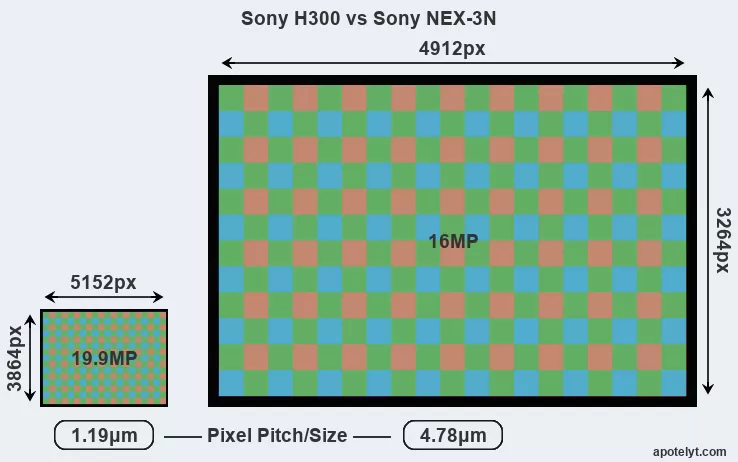
For many cameras, data on sensor performance has been reported by DXO Mark. This service is based on lab testing and assigns an overall score to each camera sensor, as well as ratings for dynamic range ("DXO Landscape"), color depth ("DXO Portrait"), and low-light sensitivity ("DXO Sports"). The adjacent table reports on the physical sensor characteristics and the outcomes of the DXO sensor quality tests for a sample of comparator-cameras.

| Camera Model |
Sensor Class |
Resolution (MP) |
Horiz. Pixels |
Vert. Pixels |
Video Format |
DXO Portrait |
DXO Landscape |
DXO Sports |
DXO Overall |
||
|---|---|---|---|---|---|---|---|---|---|---|---|
| 1. | Sony H300 | 1/2.3 | 19.9 | 5152 | 3864 | 720/30p | 20.1 | 11.4 | 630 | 45 | |
| 2. | Sony NEX-3N | APS-C | 16.0 | 4912 | 3264 | 1080/60i | 22.8 | 12.5 | 1067 | 74 | |
| 3. | Canon SX610 | 1/2.3 | 20.2 | 5184 | 3888 | 1080/30p | 20.2 | 11.6 | 712 | 47 | |
| 4. | Sony A5000 | APS-C | 19.8 | 5456 | 3632 | 1080/60i | 23.8 | 13.0 | 1089 | 79 | |
| 5. | Sony A5100 | APS-C | 24.0 | 6000 | 4000 | 1080/60p | 23.8 | 12.7 | 1347 | 80 | |
| 6. | Sony H200 | 1/2.3 | 15.2 | 5184 | 2930 | 720/30p | 19.9 | 11.2 | 529 | 44 | |
| 7. | Sony H400 | 1/2.3 | 19.9 | 5152 | 3864 | 720/30p | 20.1 | 11.4 | 630 | 45 | |
| 8. | Sony HX90V | 1/2.3 | 18.0 | 4896 | 3672 | 1080/60p | 20.2 | 11.6 | 738 | 47 | |
| 9. | Sony HX95 | 1/2.3 | 18.0 | 4896 | 3672 | 4K/30p | 20.6 | 12.1 | 1057 | 51 | |
| 10. | Sony HX99 | 1/2.3 | 18.0 | 4896 | 3672 | 4K/30p | 20.6 | 12.1 | 1058 | 51 | |
| 11. | Sony HX350 | 1/2.3 | 19.9 | 5152 | 3864 | 1080/60p | 20.5 | 11.9 | 896 | 49 | |
| 12. | Sony HX400V | 1/2.3 | 20.2 | 5184 | 3888 | 1080/60p | 20.1 | 11.4 | 629 | 45 | |
| 13. | Sony NEX-3 | APS-C | 14.0 | 4592 | 3056 | 720/30p | 22.1 | 12.0 | 830 | 68 | |
| 14. | Sony NEX-5 | APS-C | 14.0 | 4592 | 3056 | 1080/60i | 22.2 | 12.2 | 796 | 69 | |
| 15. | Sony NEX-F3 | APS-C | 16.0 | 4912 | 3264 | 1080/60i | 22.7 | 12.3 | 1114 | 73 | |
| 16. | Sony RX1R II | Full Frame | 42.2 | 7952 | 5304 | 1080/60p | 25.8 | 13.9 | 3204 | 97 | |
| 17. | Sony RX100 IV | 1-inch | 20.0 | 5472 | 3648 | 4K/30p | 22.8 | 12.6 | 591 | 70 | |
| Note: DXO values in italics represent estimates based on sensor size and age. | |||||||||||
Many modern cameras are not only capable of taking still images, but can also record movies. The two cameras under consideration both have sensors whose read-out speed is fast enough to capture moving pictures, but the NEX-3N provides a better video resolution than the H300. It can shoot movie footage at 1080/60i, while the H300 is limited to 720/30p.
Feature comparison
Beyond body and sensor, cameras can and do differ across a range of features. The H300 and the NEX-3N are similar in the sense that neither of the two has a viewfinder. The images are, thus, framed using live view on the rear LCD. That said, the NEX-3N can be equipped with an optional viewfinder – the FDA-SV1. The adjacent table lists some of the other core features of the Sony H300 and Sony NEX-3N along with similar information for a selection of comparators.

| Camera Model |
Viewfinder (Type or 000 dots) |
Control Panel (yes/no) |
LCD Specifications (inch/000 dots) |
LCD Attach- ment |
Touch Screen (yes/no) |
Max Shutter Speed * |
Max Shutter Flaps * |
Built-in Flash (yes/no) |
Built-in Image Stab |
||
|---|---|---|---|---|---|---|---|---|---|---|---|
| 1. | Sony H300 | none | n | 3.0 / 460 | fixed | n | 1/1500s | 0.8/s | Y | Y | |
| 2. | Sony NEX-3N | optional | n | 3.0 / 460 | tilting | n | 1/4000s | 4.0/s | Y | n | |
| 3. | Canon SX610 | none | n | 3.0 / 922 | fixed | n | 1/2000s | 2.5/s | Y | Y | |
| 4. | Sony A5000 | none | n | 3.0 / 461 | tilting | n | 1/4000s | 3.5/s | Y | n | |
| 5. | Sony A5100 | none | n | 3.0 / 922 | tilting | Y | 1/4000s | 6.0/s | Y | n | |
| 6. | Sony H200 | none | n | 3.0 / 460 | fixed | n | 1/1500s | 0.8/s | Y | Y | |
| 7. | Sony H400 | 210 | n | 3.0 / 460 | fixed | n | 1/2000s | 0.7/s | Y | Y | |
| 8. | Sony HX90V | 638 | n | 3.0 / 921 | tilting | n | 1/2000s | 10.0/s | Y | Y | |
| 9. | Sony HX95 | 638 | n | 3.0 / 922 | tilting | n | 1/2000s | 10.0/s | Y | Y | |
| 10. | Sony HX99 | 638 | n | 3.0 / 922 | tilting | Y | 1/2000s | 10.0/s | Y | Y | |
| 11. | Sony HX350 | 202 | n | 3.0 / 922 | tilting | n | 1/4000s | 10.0/s | Y | Y | |
| 12. | Sony HX400V | 210 | n | 3.0 / 921 | tilting | n | 1/4000s | 10.0/s | Y | Y | |
| 13. | Sony NEX-3 | optional | n | 3.0 / 920 | tilting | n | 1/4000s | 7.0/s | n | n | |
| 14. | Sony NEX-5 | optional | n | 3.0 / 920 | tilting | n | 1/4000s | 7.0/s | n | n | |
| 15. | Sony NEX-F3 | optional | n | 3.0 / 920 | tilting | n | 1/4000s | 5.5/s | Y | n | |
| 16. | Sony RX1R II | 2360 | n | 3.0 / 1229 | tilting | n | 1/4000s | 5.0/s | n | n | |
| 17. | Sony RX100 IV | 2359 | n | 3.0 / 1228 | tilting | n | 1/2000s | 16.0/s | Y | Y | |
| Note: *) Information refers to the mechanical shutter, unless the camera only has an electronic one. | |||||||||||
Concerning the storage of imaging data, both the H300 and the NEX-3N write their files to SDXC or Memory Stick PRO Duo cards.
Connectivity comparison
For some imaging applications, the extent to which a camera can communicate with its environment can be an important aspect in the camera decision process. The table below provides an overview of the connectivity of the Sony Cyber-shot DSC-H300 and Sony Alpha NEX-3N and, in particular, the interfaces the cameras (and selected comparators) provide for accessory control and data transfer.

| Camera Model |
Hotshoe Port |
Internal Mic / Speaker |
Microphone Port |
Headphone Port |
HDMI Port |
USB Port |
WiFi Support |
NFC Support |
Bluetooth Support |
||
|---|---|---|---|---|---|---|---|---|---|---|---|
| 1. | Sony H300 | - | mono / mono | - | - | micro | 2.0 | Y | - | - | |
| 2. | Sony NEX-3N | - | stereo / mono | - | - | micro | 2.0 | - | - | - | |
| 3. | Canon SX610 | - | - / - | - | - | micro | 2.0 | Y | Y | - | |
| 4. | Sony A5000 | - | stereo / mono | - | - | micro | 2.0 | Y | Y | - | |
| 5. | Sony A5100 | - | stereo / mono | - | - | micro | 2.0 | Y | Y | - | |
| 6. | Sony H200 | - | mono / mono | - | - | - | 2.0 | - | - | - | |
| 7. | Sony H400 | - | mono / mono | - | - | micro | 2.0 | Y | - | - | |
| 8. | Sony HX90V | - | stereo / mono | - | - | micro | 2.0 | Y | Y | - | |
| 9. | Sony HX95 | - | stereo / mono | - | - | micro | 2.0 | Y | Y | Y | |
| 10. | Sony HX99 | - | stereo / mono | - | - | micro | 2.0 | Y | Y | Y | |
| 11. | Sony HX350 | - | stereo / mono | - | - | micro | 2.0 | - | - | - | |
| 12. | Sony HX400V | Y | stereo / mono | - | - | micro | 2.0 | Y | Y | - | |
| 13. | Sony NEX-3 | Y | stereo / mono | - | - | mini | 2.0 | - | - | - | |
| 14. | Sony NEX-5 | Y | stereo / mono | - | - | mini | 2.0 | - | - | - | |
| 15. | Sony NEX-F3 | Y | stereo / mono | - | - | mini | 2.0 | - | - | - | |
| 16. | Sony RX1R II | Y | stereo / mono | Y | - | micro | 2.0 | Y | Y | - | |
| 17. | Sony RX100 IV | - | stereo / mono | - | - | micro | 2.0 | Y | Y | - |
It is notable that the H300 offers wifi support, while the NEX-3N does not. Wifi can be a very convenient means to transfer image data to an off-camera location.
Both the H300 and the NEX-3N have been discontinued, but can regularly be found used on ebay. The NEX-3N was replaced by the Sony A5000, while the H300 does not have a direct successor. Further information on the features and operation of the H300 and NEX-3N can be found, respectively, in the Sony H300 Manual (free pdf) or the online Sony NEX-3N Manual.
Review summary
So what conclusions can be drawn? Is the Sony H300 better than the Sony NEX-3N or vice versa? The listing below highlights the relative strengths of the two models.
Arguments in favor of the Sony Cyber-shot DSC-H300:
- More detail: Offers more megapixels (19.9 vs 16MP) with a 9% higher linear resolution.
- Maximized detail: Lacks an anti-alias filter to exploit the sensor's full resolution potential.
- Ready to shoot: Has a lens built-in, whereas the NEX-3N requires a separate lens.
- Sharper images: Has hand-shake reducing image stabilization built-in.
- Easier file upload: Has wifi built in for automatic backup or image transfer to the web.
- More affordable: Was introduced at a lower price, despite coming with a built-in lens.
- More modern: Is somewhat more recent (announced 11 months after the NEX-3N).
Advantages of the Sony Alpha NEX-3N:
- Better moiré control: Has an anti-alias filter to avoid artificial patterns to appear in images.
- Better image quality: Features bigger pixels on a larger sensor for higher quality imaging.
- Richer colors: The pixel size advantage translates into images with better, more accurate colors.
- More dynamic range: Larger pixels capture a wider spectrum of light and dark details.
- Better low-light sensitivity: Larger pixels means good image quality even under poor lighting.
- Better video: Provides higher definition movie capture (1080/60i vs 720/30p).
- More framing options: Can be equipped with a hotshoe-mounted accessory-viewfinder.
- More flexible LCD: Has a tilting screen for odd-angle shots in landscape orientation.
- More selfie-friendly: Has an articulated screen that can be turned to be front-facing.
- Faster shutter: Has higher mechanical shutter speed (1/4000s vs 1/1500s) to freeze action.
- Faster burst: Shoots at higher frequency (4 vs 0.8 flaps/sec) to capture the decisive moment.
- More flexible: Takes interchangeable lenses and can thus be used with specialty optics.
- More compact: Is smaller (110x62mm vs 128x89mm) and will fit more readily into a bag.
- Longer lasting: Gets more shots (480 versus 350) out of a single battery charge.
- More heavily discounted: Has been on the market for longer (launched in February 2013).
If the count of relative strengths (bullet points above) is taken as a measure, the NEX-3N is the clear winner of the contest (15 : 7 points). However, the pertinence of the various camera strengths will differ across photographers, so that you might want to weigh individual camera traits according to their importance for your own imaging needs before making a camera decision. A professional wildlife photographer will view the differences between cameras in a way that diverges from the perspective of a family photog, and a person interested in architecture has distinct needs from a sports shooter. Hence, the decision which camera is best and worth buying is often a very personal one.
How about other alternatives? Do the specifications of the Sony H300 and the Sony NEX-3N place the cameras among the top in their class? Find out in the latest Best Superzoom Camera and Best Mirrorless Interchangeable Lens Camera listings whether the two cameras rank among the cream of the crop.
In any case, while the comparison of technical specifications can provide a useful overview of the capabilities of different cameras, it remains partial and cannot reveal, for example, the shooting experience and imaging performance when actually working with the H300 or the NEX-3N. At times, user reviews, such as those published at amazon, address these issues in a useful manner, but such feedback is on many occasions incomplete, inconsistent, and unreliable.
Expert reviews
This is why expert reviews are important. The table below provides a synthesis of the camera assessments of some of the best known photo-gear review sites (amateurphotographer [AP], cameralabs [CL], digitalcameraworld [DCW], dpreview [DPR], ephotozine [EPZ], photographyblog [PB]). As can be seen, the professional reviewers agree in many cases on the quality of different cameras, but sometimes their assessments diverge, reinforcing the earlier point that a camera decision is often a very personal choice.

| Camera Model |
AP score |
CL score |
DCW score |
DPR score |
EPZ score |
PB score |
Camera Launch |
Launch Price (USD) |
Street Price |
||
|---|---|---|---|---|---|---|---|---|---|---|---|
| 1. | Sony H300 | .. | + | .. | .. | 4.5/5 | 4/5 | Feb 2014 | 219 | ebay.com | |
| 2. | Sony NEX-3N | 3/5 | .. | .. | .. | 4.5/5 | 4.5/5 | Feb 2013 | 499 | ebay.com | |
| 3. | Canon SX610 | .. | .. | .. | .. | 4/5 | 4/5 | Jan 2015 | 249 | ebay.com | |
| 4. | Sony A5000 | 3/5 | + | .. | .. | 4.5/5 | 4.5/5 | Jan 2014 | 449 | ebay.com | |
| 5. | Sony A5100 | 4.5/5 | + | .. | .. | 4.5/5 | 5/5 | Aug 2014 | 549 | ebay.com | |
| 6. | Sony H200 | .. | .. | .. | .. | 3.5/5 | 3.5/5 | Jan 2013 | 249 | ebay.com | |
| 7. | Sony H400 | .. | o | .. | .. | 3.5/5 | 3.5/5 | Feb 2014 | 319 | ebay.com | |
| 8. | Sony HX90V | 4/5 | + + | .. | .. | 4/5 | 4.5/5 | Apr 2015 | 429 | ebay.com | |
| 9. | Sony HX95 | .. | .. | .. | .. | .. | .. | Aug 2018 | 429 | ebay.com | |
| 10. | Sony HX99 | .. | .. | .. | .. | 4/5 | 4.5/5 | Aug 2018 | 449 | ebay.com | |
| 11. | Sony HX350 | .. | .. | .. | .. | .. | 4/5 | Dec 2016 | 449 | ebay.com | |
| 12. | Sony HX400V | 4/5 | + + | .. | .. | 4/5 | 4/5 | Feb 2014 | 499 | ebay.com | |
| 13. | Sony NEX-3 | .. | .. | .. | 70/100 | 4.5/5 | 4/5 | May 2010 | 599 | ebay.com | |
| 14. | Sony NEX-5 | 3/5 | + + | .. | 71/100 | 4.5/5 | 4/5 | May 2010 | 699 | ebay.com | |
| 15. | Sony NEX-F3 | 4/5 | .. | .. | 74/100 | 4.5/5 | 4.5/5 | May 2012 | 599 | ebay.com | |
| 16. | Sony RX1R II | 5/5 | .. | .. | 82/100 | .. | 4.5/5 | Oct 2015 | 3,299 | ebay.com | |
| 17. | Sony RX100 IV | 4.5/5 | + + | .. | 85/100 | 4/5 | 4.5/5 | Jun 2015 | 999 | ebay.com | |
| Note: (+ +) highly recommended; (+) recommended; (o) reviewed; (..) not available. | |||||||||||
The above review scores should be interpreted with care, though. The ratings were established in reference to similarly priced cameras that were available in the market at the time of the review. Hence, a score should always be seen in the context of the camera's market launch date and its price, and comparing ratings of very distinct cameras or ones that are far apart in terms of their release date have little meaning. It should also be noted that some of the review sites have over time altered the way they render their verdicts.

Check H300 offers at
ebay.com

Check NEX-3N offers at
ebay.com
Other camera comparisons
Did this review help to inform your camera decision process? In case you are interested in seeing how other cameras pair up, just make a corresponding selection in the search boxes below. There is also a set of direct links to comparison reviews that other users of the CAM-parator app explored.
- Canon 1300D vs Sony H300
- Canon 80D vs Sony H300
- Canon G5 X Mark II vs Sony NEX-3N
- Fujifilm X-A10 vs Sony NEX-3N
- Leica S Typ 006 vs Sony H300
- Nikon 1 V1 vs Sony NEX-3N
- Nikon D5000 vs Sony NEX-3N
- Nikon D7000 vs Sony NEX-3N
- Olympus E-PL1 vs Sony H300
- Olympus E-PL5 vs Sony H300
- Panasonic G10 vs Sony NEX-3N
- Sony A99 II vs Sony H300
Specifications: Sony H300 vs Sony NEX-3N
Below is a side-by-side comparison of the specs of the two cameras to facilitate a quick review of their differences and common features.
| Camera Model | Sony H300 | Sony NEX-3N |
|---|---|---|
| Camera Type | Fixed lens compact camera | Mirrorless system camera |
| Camera Lens | 25-875mm f/3.4-6.5 | Sony E mount lenses |
| Launch Date | February 2014 | February 2013 |
| Launch Price | USD 219 | USD 499 |
| Sensor Specs | Sony H300 | Sony NEX-3N |
| Sensor Technology | CCD | CMOS |
| Sensor Format | 1/2.3" Sensor | APS-C Sensor |
| Sensor Size | 6.17 x 4.55 mm | 23.4 x 15.6 mm |
| Sensor Area | 28.0735 mm2 | 365.04 mm2 |
| Sensor Diagonal | 7.7 mm | 28.1 mm |
| Crop Factor | 5.6x | 1.5x |
| Sensor Resolution | 19.9 Megapixels | 16 Megapixels |
| Image Resolution | 5152 x 3864 pixels | 4912 x 3264 pixels |
| Pixel Pitch | 1.19 μm | 4.78 μm |
| Pixel Density | 70.91 MP/cm2 | 4.39 MP/cm2 |
| Moiré control | no AA filter | Anti-Alias filter |
| Movie Capability | 720/30p Video | 1080/60i Video |
| ISO Setting | 80 - 3,200 ISO | 200 - 16,000 ISO |
| Image Processor | BIONZ | BIONZ |
| DXO Sensor Quality (score) | .. | 74 |
| DXO Color Depth (bits) | .. | 22.8 |
| DXO Dynamic Range (EV) | .. | 12.5 |
| DXO Low Light (ISO) | .. | 1067 |
| Screen Specs | Sony H300 | Sony NEX-3N |
| Viewfinder Type | no viewfinder | Viewfinder optional |
| LCD Framing | Live View | Live View |
| Rear LCD Size | 3.0inch | 3.0inch |
| LCD Resolution | 460k dots | 460k dots |
| LCD Attachment | Fixed screen | Tilting screen |
| Shooting Specs | Sony H300 | Sony NEX-3N |
| Focus System | Contrast-detect AF | Contrast-detect AF |
| Manual Focusing Aid | no Peaking Feature | Focus Peaking |
| Max Shutter Speed (mechanical) | 1/1500s | 1/4000s |
| Continuous Shooting | 0.8 shutter flaps/s | 4 shutter flaps/s |
| Fill Flash | Built-in Flash | Built-in Flash |
| Storage Medium | MS or SDXC cards | MS or SDXC cards |
| Single or Dual Card Slots | Single card slot | Single card slot |
| UHS card support | no | no |
| Connectivity Specs | Sony H300 | Sony NEX-3N |
| External Flash | no Hotshoe | no Hotshoe |
| USB Connector | USB 2.0 | USB 2.0 |
| HDMI Port | micro HDMI | micro HDMI |
| Wifi Support | Wifi built-in | no Wifi |
| Body Specs | Sony H300 | Sony NEX-3N |
| Battery Type | Sony 4xAA | Sony NP-FW50 |
| Battery Life (CIPA) | 350 shots per charge | 480 shots per charge |
| Body Dimensions |
128 x 89 x 92 mm (5.0 x 3.5 x 3.6 in) |
110 x 62 x 35 mm (4.3 x 2.4 x 1.4 in) |
| Camera Weight | 590 g (20.8 oz) | 269 g (9.5 oz) |

Check H300 offers at
ebay.com

Check NEX-3N offers at
ebay.com
Did you notice an error on this page? If so, please get in touch, so that we can correct the information.
